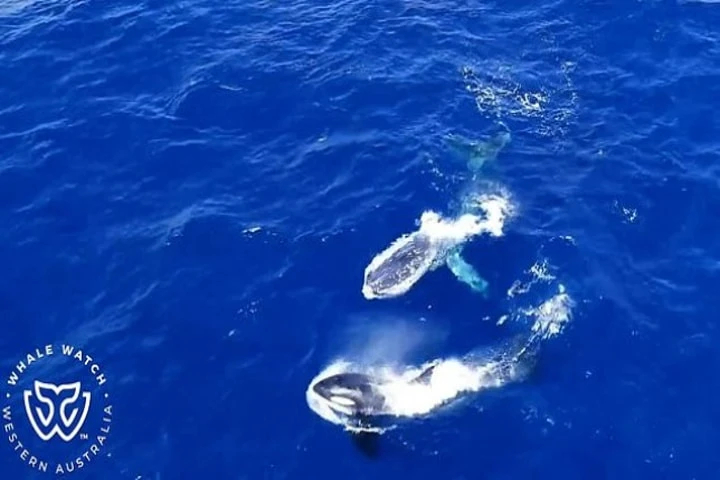

A orca pod instead of attacking the humpback whale, helped it to get rid of a rope which was entangled in its tail
<p>
<strong>Strange are the ways of nature and its creatures and this was in full view in an awesome incident that happened off the coast of western Australia &ndash; Bremer Bay — in which a humpback whale (Megaptera novaeangliae) seemed to be freed from an entangled rope by a group of Orcas killer whales who normally hunt to kill these creatures.</strong></p>
<p>
As per a report in livescience.com it is not clear if the pod were manipulating the rope or as to why in the first place they went to the whale? The whole incident was captured by a drone video by the Whale Watch Western Australia observers.</p>
<p>
<strong>Video:</strong></p>
<p>
<iframe allow="accelerometer; autoplay; clipboard-write; encrypted-media; gyroscope; picture-in-picture" allowfullscreen="" frameborder="0" height="315" src="https://www.youtube.com/embed/g7WVl9QBLs0" title="YouTube video player" width="560"></iframe></p>
<p>
In the past people have witnessed orcas (Orcinus orca) attacking humpbacks though they usually target calves and younger ones in the lot instead of the full-grown ones. Their method of attack is to seize the flippers of the whale, turn them over to drown them.</p>
<p>
Eric Hoyt, the noted author of the book &ldquo;Orca: The Whale Called Killer&rdquo; and Research Fellow at the charity Whale and Dolphin Conservation wonders as to why the orcas didn&rsquo;t attack the whale.</p>
<p>
Sharing his views with Live Science he wrote: <a href="https://www.livescience.com/orcas-free-entangled-humpback-whale">&quot;It could be that the orcas&#39; summer diet</a> is distinctly different and humpbacks are &#39;out of season&#39; (it is well documented that they do feed on beaked whales here, which would be a different hunting and feeding operation, a different food). It could be simply that the orcas have just eaten or are in the middle of some other behaviour, or that the entanglement somehow put them off.&quot;</p>
<p>
Many veteran whale watchers described the action on part of orcas as selfless. These creatures are known to have a complex social life and brain that is highly developed which is capable of empathy and emotion. Yet, one can&rsquo;t be sure if it is altruism for a fellow creature which guided the orcas.</p>
<p>
The sighting of the humpback in Bremer Bay was a surprise as they are usually found between June and August, when they are heading to the subtropical waters for breeding and again between September and November when they are heading back to Antarctica for feeding on krill.</p>
<p>
Moreover, this creature was in a pretty bad shape as it was thin and had sea lice all over its body and with a rope tangled around its tail, it was an absolutely easy picking for orcas.</p>
<p>
<strong>Also read: <a href="https://www.indianarrative.com/science-news/scientists-solve-the-mystery-of-why-mighty-whales-do-not-choke-while-feeding-144577.html">Scientists solve the mystery of why mighty whales do not choke while feeding</a></strong></p>
<p>
Seeing the humpback, two male orcas called Blade and Hookfin checked the creature out. The whale lashed its pectoral fins and tail fluke to defend itself. As per Whale Western Australia, the orca pod matriarch, called Queen, approached this scene of swirl of splashing and white water. Following the clearing of the water, the huge piece of rope which had been binding the whale&rsquo;s fluke was found afloat. The next move of the orcas swimming away in the opposite direction of the whale is what surprised whale watchers.</p>
<p>
Describing the scene, the whale watch crew wrote in the narrative of their video: &quot;The incredible fact that the Orca managed to rid most of the rope from this whale before letting him swim away freely was truly fascinating. [D]id the Orca deliberately rescue this Humpback or was the decision made that due to his ill health the effort of the hunt was not worth the energy reward at the end[?]&quot;</p>
<p>
There is no easy and straight answer, said Hoyt adding that it is possible the orcas accidentally or intentionally got hold of the line but one can&rsquo;t categorically say that it was with the intent of untangling the whale.</p>
<p>
<strong>Also read: <a href="https://www.indianarrative.com/science-news/whales-follow-sound-signals-to-hunt-down-fast-moving-prey-125650.html">Whales follow sound signals to hunt down fast moving prey</a></strong></p>
<p>
The incident highlights how difficult it is to comprehend the behaviour and impulses of the marine mammals.</p>
<p>
Summing up, Hoyt wrote: &quot;The range of behaviour by whales at sea is complex and varies depending on many factors. It&#39;s difficult to interpret behaviour!&quot;</p>
Taiwan's Ministry of National Defence (MND) stated that it detected 50 Chinese military aircraft and…
US President Donald Trump is expected to make a decision about whether to take direct…
Prime Minister Narendra Modi and his Croatian counterpart Andrej Plenkovic have noted the importance of…
Israel Defence Forces Spokesperson Brigadier General Effie Defrin on Thursday said that Iran has expressed…
India's Hindustan Aeronautics Limited (HAL) and French engine manufacturer, Safran Aircraft Engines, signed an agreement…
India has emerged as a country with the third-largest growth in power generation capacity globally…